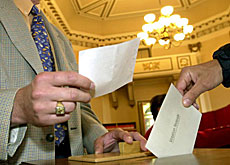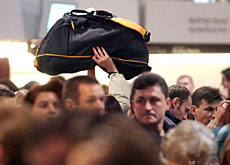Born in Switzerland, but still far from citizens

The children of economic migrants who came to Switzerland in the 1960s are well integrated into society, according to a new study.
But many still don’t have Swiss nationality, which means no political rights despite being born and brought up in this country.
The study, carried out by the Swiss National Science Foundation, looked at almost 400 second-generation Italians and Spaniards – aged between 18 and 35 – living in the cantons of Basel and Geneva.
The aim was to find out what had become of the children of workers who sought a better life in Switzerland.
Rosita Fibbi, one of the study’s authors, said the results of the report, the first of its kind to be carried out in Switzerland, went against popular perceptions.
“Foreigners are supposed to be very different and to keep on being different over generations, and that’s not what we are finding,” she said.
Manual workers
Second-generation Italians and Spaniards – the sons and daughters of mainly manual workers without higher education – were found to have attained a high level of schooling and professional success.
Indeed, the study suggests that the second generation was more likely to pursue higher education and was better represented in university and independent professions than their Swiss counterparts.
Claudio Micheloni, a member of the Italian-Swiss immigrant community, said it had been hard for second-generation children to make the jump into further education.
But he credits the Swiss system for making it possible. “It was an enormous step to get a better education but we were able to do it thanks to the schools and support we have in Switzerland.
“Nowadays, the third generation no longer has these kind of problems because their parents have already absorbed the shock of immigration,” he told swissinfo.
Family life
Another difference was found in their approach to family life. Second-generation children were found to live with their parents for longer and women were more likely to return to work after the birth of their first child than were Swiss women.
Fibbi put this down to close family ties and the willingness of immigrant parents to help out financially and with childminding duties.
In return, young people often helped their parents’ generation with administrative tasks.
The study found that although it was easier for the second generation to obtain Swiss nationality than it was for their parents, 57 per cent still retained their foreign passports.
Fibbi said one of the main reasons was that being born in Switzerland did not guarantee immediate Swiss citizenship.
Although 80 per cent of the second generation were born in the country and 90 per cent have spent their entire life in Switzerland, they have still had to apply to become Swiss.
Exclusion
Fibbi said high achievers were more likely to seek citizenship, and that two out of five second-generation children did so.
“Only the ones that performed the best in school and in professional activities have gone through naturalisation,” said Fibbi.
“They are living here – most of them were born here and they feel they are entitled to Swiss nationality.”
The report also found that some of the second generation were reluctant to take Swiss citizenship because of compulsory military service and unwillingness to give up their parents’ nationality. Switzerland does not permit Europeans from some countries to be dual nationals.
The report comes shortly before parliament is due to resume discussions on granting automatic citizenship rights to the second generation.
swissinfo, Isobel Johnson
The study examined almost 400 young adults aged between 18 and 35 living in the cantons of Basel and Geneva.
Second generation Italians and Spaniards were found to have attained a high level of schooling and professional success.
But they retained very close family ties and links to their country of origin.
57% still had a foreign passport.
Many would like automatic Swiss citizenship.

In compliance with the JTI standards
More: SWI swissinfo.ch certified by the Journalism Trust Initiative


You can find an overview of ongoing debates with our journalists here. Please join us!
If you want to start a conversation about a topic raised in this article or want to report factual errors, email us at english@swissinfo.ch.